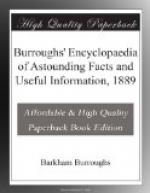ILLUSTRIOUS MEN AND WOMEN.—It is not likely that any two persons would agree as to who are entitled to the first fifty places on the roll of great men and great women. Using “great” in the sense of eminence in their professions, of great military commanders the following are among the chief: Sesostris, the Egyptian conqueror, who is represented as having subdued all Asia to the Oxus and the Ganges, Ethiopia, and a part of Europe; Cyrus the Great; Alexander the Great; Hannibal; Che-Hwanti, who reduced all the kingdoms of China and Indo-China to one empire, and constructed the Great Wall; Caesar; Genghis Khan, the Tartar chief, who overran all Asia and a considerable part of Europe; Napoleon Bonaparte; Ulysses S. Grant, and General Von Moltke. Among the most illustrious benefactors of mankind, as statesmen, lawgivers and patriots, stand Moses, David, Solon, Numa Pompilius, Zoroaster, Confucius, Justinian, Charlemagne, Cromwell, Washington and Lincoln. Eminent among the philosophers, rhetoricians and logicians stand Socrates, Plato, Aristotle, Seneca, the two Catos, and Lord Bacon; among orators, Pericles, Demosthenes, Cicero, Mirabeau, Burke, Webster and Clay; among poets, Homer, Virgil, Dante, Milton, and Shakespeare; among painters and sculptors, Phidias, Parrhasius, Zenxis, Praxiteles, Scopas, Michael Angelo, Raphael and Rubens; among philanthropists, John Howard; among inventors, Archimedes, Watt, Fulton, Arkwright, Whitney and Morse; among astronomers, Copernicus, Galileo, Tycho Brahe, Newton, La Place and the elder Herschel. Here are sixty names of distinguished men, and yet the great religious leaders, excepting Moses and Zoroaster, have not been named. Among these stand Siddhartha or Buddha, Mahomet, Martin Luther, John Knox and John Wesley. Then the great explorers and geographers of the world have not been noticed, among whom Herodotus, Strabo, Pliny, Vasco de Gama, Columbus and Humboldt barely lead the van.
Of eminent women there are Seling, wife of the Emperor Hwang-ti, B. C. 2637, who taught her people the art of silk-raising and weaving; Semiramis, the Assyrian Queen; Deborah, the heroic warrior prophetess of the Israelites; Queen Esther, who, with the counsel of her cousin, Mordecai, not only saved the Jews from extermination, but lifted them from a condition of slavery into prosperity and power; Dido, the founder of Carthage; Sappho, the eminent Grecian poetess; Hypatia, the eloquent philosopher; Mary, the mother of Christ; Zenobia, Queen of Palmyra; the mother of St. Augustine; Elizabeth of Hungary; Queen Elizabeth of England; Queen Isabella of Spain; the Empress Maria Theresa; Margaret the Great of Denmark; Catherine the Great of Russia, Queen Victoria; Florence Nightingale; Mme. de Stael: Mrs. Fry, the philanthropist; among authoresses, Mrs. Hemans, Mrs. Sigourney, Mrs. Browning, “George Sand,” “George Eliot,” and Mrs. Stowe; and among artists, Rosa Bonheur, and our own Harriet Hosmer.




